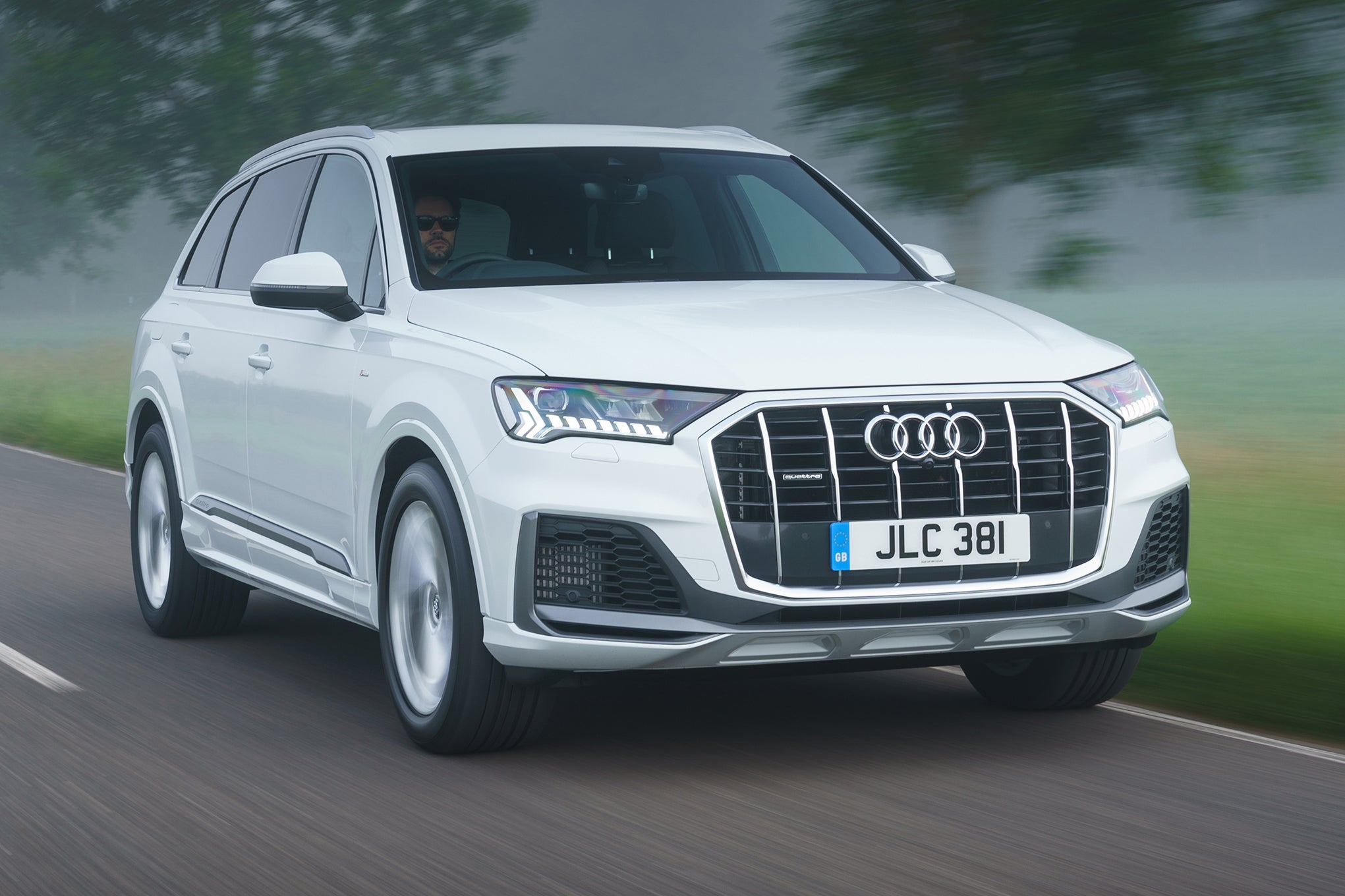Audi Q7 Review 2025: Price, specs & boot space
Written by Andrew Brady
Quick overview
Pros
- Comfortable and quiet on the road
- Cabin is practical and great on quality
- Lots of luxury equipment
Cons
- Distracting touchscreen infotainment system
- PHEV version only has five seats
- Newer rivals are perhaps more fashionable
Overall verdict on the Audi Q7
"Large and expensive it may be, but the Audi Q7 is simply unmatched for its all-round ability, practicality and attention to detail. Even several years on from launch it remains one of the best cars in its class."
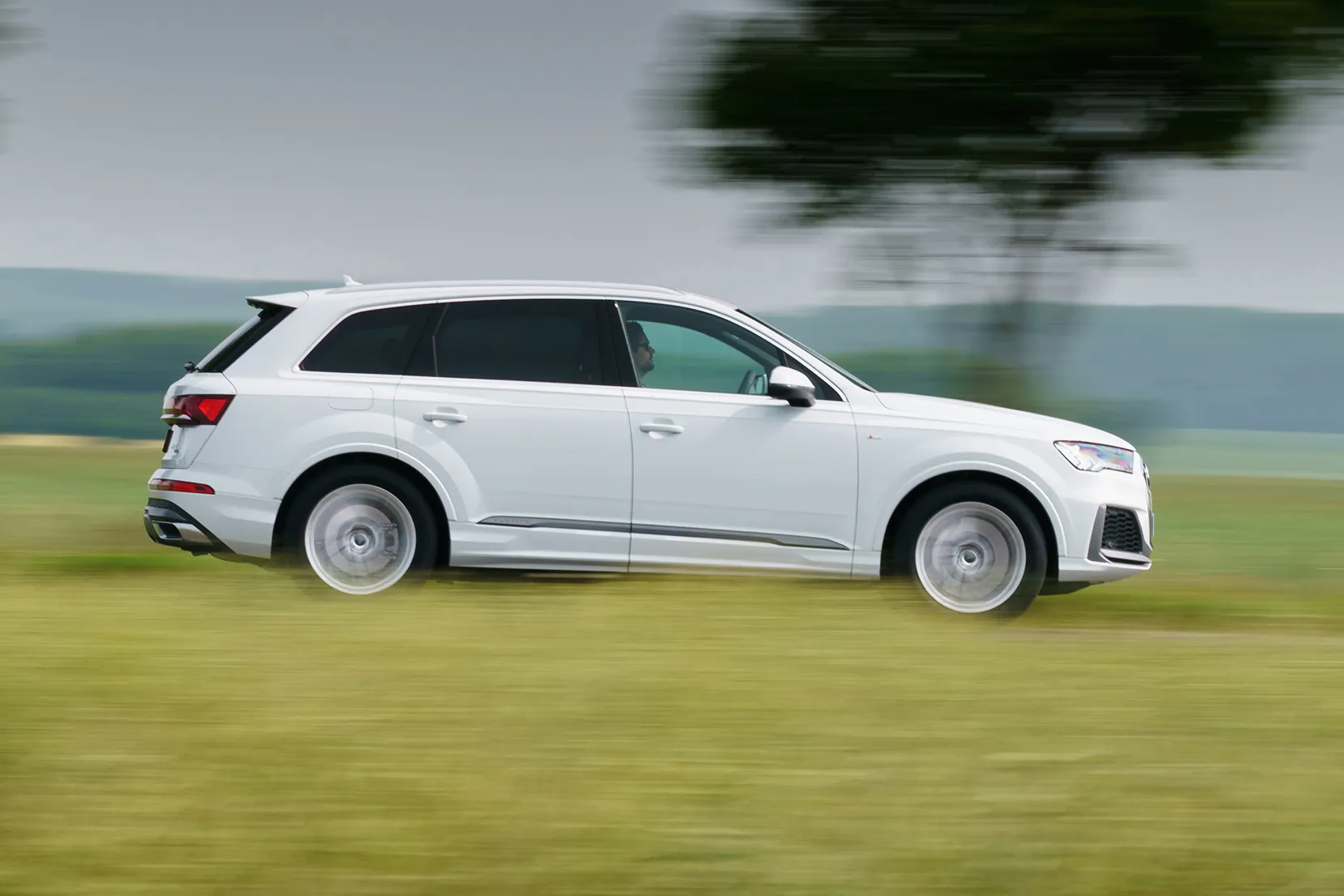
The Audi Q7 isn't a car that'll win favour with environmentalists. They'll look at its huge size and muscular design and think you don't care about climate change or, worse still, might be overcompensating for something. That's the main drawback out of the way, however, and certainly not one unique to the Q7. You see, there isn’t a single area in which Audi’s big seven-seater SUV doesn’t do a thoroughly brilliant job. That’s what makes it the best all-rounder in the class, and - even though it's getting on a bit - one of the best SUVs on sale. Our Audi Q7 review will tell you exactly why.
Key rivals for the Audi Q7 include its biggest competitor, the BMW X5. But there is also close competition in the form of the excellent Land Rover Discovery and Volvo XC90, plus the Mercedes-Benz GLE.
First and foremost, it’s a brilliant car for a big family. It’s among the roomiest cars of its type, with generous space surrounding each of its seven seats, and with so many different options over how much of the space is used for seating and how much is used for cargo, it’s also incredibly versatile. Those on board will also feel spoiled due to the impressive cabin quality and generous luxury kit.
Just as importantly, it’s an ideal family car in the way it drives. On all sorts of roads, the Audi Q7 stays comfortable and quiet, keeping life relaxed and peaceful on every journey.
And despite its impressive comfort, it’s still impressively agile in corners, keeping things safe and settled for passengers, and surprisingly entertaining for the driver. One quick caveat here: the best Audi Q7s ride on air suspension. This was standard on post-facelift cars of 2019 onwards, but optional before that. If you’re buying an earlier car, check it has air suspension fitted, because you definitely want it.
The engines, meanwhile, give an impressive blend of performance, economy and refinement, while lots of safety equipment and a five-star Euro NCAP rating means your family will be well looked after. Any complaints? Well the touchscreen infotainment system on post-facelift cars is a bit fiddly and distracting, and the automatic gearbox could be quicker to respond at times, but other than that, there’s very little to grumble about.
When this car was first launched back in 2015, some members of the motoring press criticised it for being dull, and lacking character. We disagree, but everyone’s entitled to their opinion. Besides, who needs character when it's absolutely brilliant at everything else?
Looking for a used car for sale? We've got 100s of Audi Approved Used Cars for Sale for you to choose from, including a wide range of Audi Q7s for sale.
Is the Audi Q7 right for you?
Ask yourself one question: Do I want arguably the best all-round seven-seat SUV you can buy? Of course you do. Why wouldn’t you? If that’s the case, then the Audi Q7 is it.
It’s not the biggest car of its type, or the cheapest, or the newest, or the most practical, or the most ergonomically sorted. However, in those areas in which it doesn’t lead the class (there are plenty in which it does, but the way), it’s still right up there with the cars that do. This makes the Audi Q7 an unbelievable all-rounder that’ll slot seamlessly into the daily life of any well-heeled family, instantly making it easier, more relaxing, more comfortable, more entertaining and more sophisticated.
Granted, if you’re after a luxury off-roader with seven seats, rather than an SUV, then the more rugged Land Rover Discovery will suit you better. If you’re like most SUV buyers, though, and you never venture further into the countryside than the muddy car park of your local farm shop, then the Q7 will be the perfect family car.
What other cars are similar to the Audi Q7?
As a big, luxurious seven-seat SUV, the Audi Q7’s most obvious rivals are the Volvo XC90 and Land Rover Discovery. Obviously, you can’t talk about an Audi offering without mentioning BMW and Mercedes, and although the BMW X5 and Mercedes GLE are five-seaters as standard, both are also offered in seven-seat form as an option.
Step up a level on both size and cost, and you might also consider the BMW X7 and Mercedes GLS from the same stables. The Lexus RX-L would also be competing for your custom in the premium sphere, while more affordable alternatives include the Peugeot 5008, Skoda Kodiaq and Volkswagen Tiguan Allspace.
Comfort and design: Audi Q7 interior
"What you see inside your Audi Q7 will very much depend on how old it is. The main difference between pre- and post-facelift (2019) cars is the infotainment screens, but there are some spec changes, too. Overall, and Q7 is a superb place to sit, with excellent quality and plenty of space."
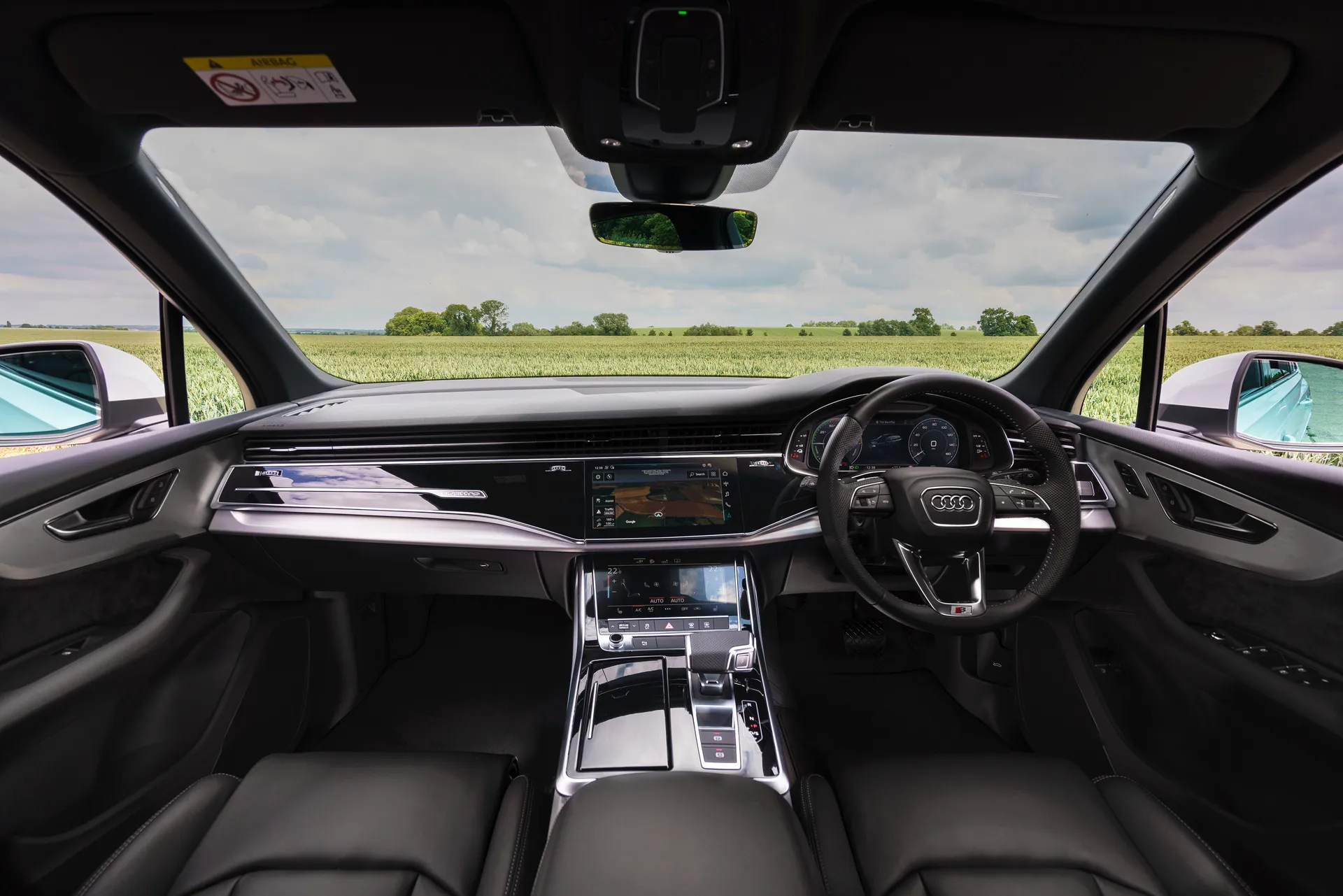
Early versions of the 2015-on Audi Q7 had conventional knobs and buttons slap-bang in the middle of the dashboard to control the ventilation and various other bits and bobs, while an infotainment screen popped up electrically out of the top of the dash. The various buttons and dials were clearly marked and worked well. The instruments were digital items rather than the traditional analogue dials, and these also presented all sorts of other information and functionality to the driver, and they worked well, too.
The dashboard design changed unrecognisably after the 2019 facelift, though. This integrated the infotainment screen into the dashboard itself and replaced the physical ventilation controls with another touchscreen panel, bringing the design into line with Audi’s newer luxury offerings such as the A8 limo and e-tron electric SUV.
If we’re honest, it was a backward step in terms of ergonomics. While you could find the old controls by feel, that’s not the case with the screen, and you have to stare intently at the small on-screen icons to make any inputs, distracting you from the road ahead. That said, it does all look very cool, and the 'haptic' feedback (which gives a pulse through the screen to confirm your selection) does help matters.
All versions have supportive seats that move electrically to help you find a comfy driving position. You sit up high and get a nice clear view of the road ahead, but wide rear window pillars can hamper your rear view. At least every version comes with front and rear parking sensors and a reversing camera.
Quality and design
This area is an Audi trademark, so it’s no surprise that the Q7 absolutely smashes it here. All of the materials on view - whether they’re dense soft-surfaced plastics, stitched leather, glossy veneers or genuine metallic trims - are extremely high-grade, and they’re blended thoughtfully and tastefully to deliver a sense of effortless class.
You have to delve very deep into the lower reaches of the Audi Q7's cabin before you find a single panel of a quality that doesn’t quite measure up to the high standards of the rest, and even then, the differences are miniscule.
The precision and solidity with which everything is bolted together, plus the slick, deftly-damped way all the switches and controls work, also help toward providing a level of sophistication that is unsurpassed by any of the Q7’s rivals, even bigger, pricier ones like the BMW X7 and Mercedes GLS. True, newer models feel a little more high-tech than the older ones due to the extra screen, but both versions are pretty much flawless when it comes to quality.
Infotainment: Touchscreen, USB, nav and stereo in the Audi Q7
As we’ve already said, the Audi Q7’s interior and infotainment system changed completely during the 2019 facelift, so we effectively have two systems to talk about here.
The earlier one was great. An 8.3-inch screen rose electrically from the top of the dashboard, and you scrolled through the logical on-screen menus using a rotary dial controller and a handful of shortcut buttons. Simple, intuitive and not distracting. There was also a touchpad provided that allowed you handwrite instructions, which was rather more of a faff, but there was nothing you couldn’t do without it if you chose to ignore it.
With the 2019 facelift, though, the motoring world’s obsession with touchscreen technology took over, and this system was ditched for a new twin-screen arrangement that was controlled by jabbing fingers at a screen. In fairness, it’s not bad as touchscreens go with sharp graphics and quick responses. However, some of the on-screen icons are a bit small and tricky to hit, and the fact remains that touchscreens are way more distracting when you're driving than physical controls.
All the functionality you’d expect in a luxury car is covered, though, including DAB radio, navigation, wireless phone charging and various connected services.
Space and practicality: Audi Q7 boot space
Even in the context of large, luxurious seven-seat SUVs, the Audi Q7 is about as good as it gets in practicality terms. Perhaps that's no surprise given the sheer size of the thing.
In terms of external dimensions, the Audi Q7 is 5,063mm long, 1,968mm wide and 1,741mm tall. That's over 100mm longer than the Land Rover Discovery and Volvo XC90, although a BMW X7 and Mercedes-Benz GLS are longer still. Nevertheless, you'd never call the Q7 agile or compact. Unless, that is, you lived in North America.
Inside the Audi Q7 there's loads of space up front, obviously, and the three individual chairs in the middle row are very generous on both headroom and legroom, so tall adults will fit comfortably. There’s enough shoulder space to sit three adults across the rear bench, too, and the middle seat is almost as wide as those either side, but whoever’s in the middle will have to sit with their legs splayed either side of a bulky transmission tunnel.
Each one of the middle-row chairs slides and reclines independently, and the outer ones tip and tumble far enough out of the way to allow pretty easy access to the third row. The space surrounding these rearmost seats is among the most generous in the class: not quite as much as in a Land Rover Discovery or a BMW X7, but it easily has the beating of a BMW X5 or Mercedes GLE. Adults of a reasonable size will fit, but those much over six foot will probably want to bagsy one of the chairs further forwards on long journeys.
With seven seats in place, there’s more boot space in the back of an Audi Q7 than in many rivals at 295 litres, which is enough for a few large shopping bags. The rearmost chairs drop flush into the floor to give you a massive 865-litre boot in regular five-seat mode, enough for pushchairs, kids’ bikes, or anything else a family could think to carry. The middle row also drops flat into the floor, leaving you with an extended load-bay that’s level and true, not to mention massive.
Handling and ride quality: What is the Audi Q7 like to drive?
"It's worth noting that the Audi Q7 is at its best with air suspension, which was optional on earlier cars and standard on post-2019 models. It's an option well worth seeking out as it improves the driving experience no end."
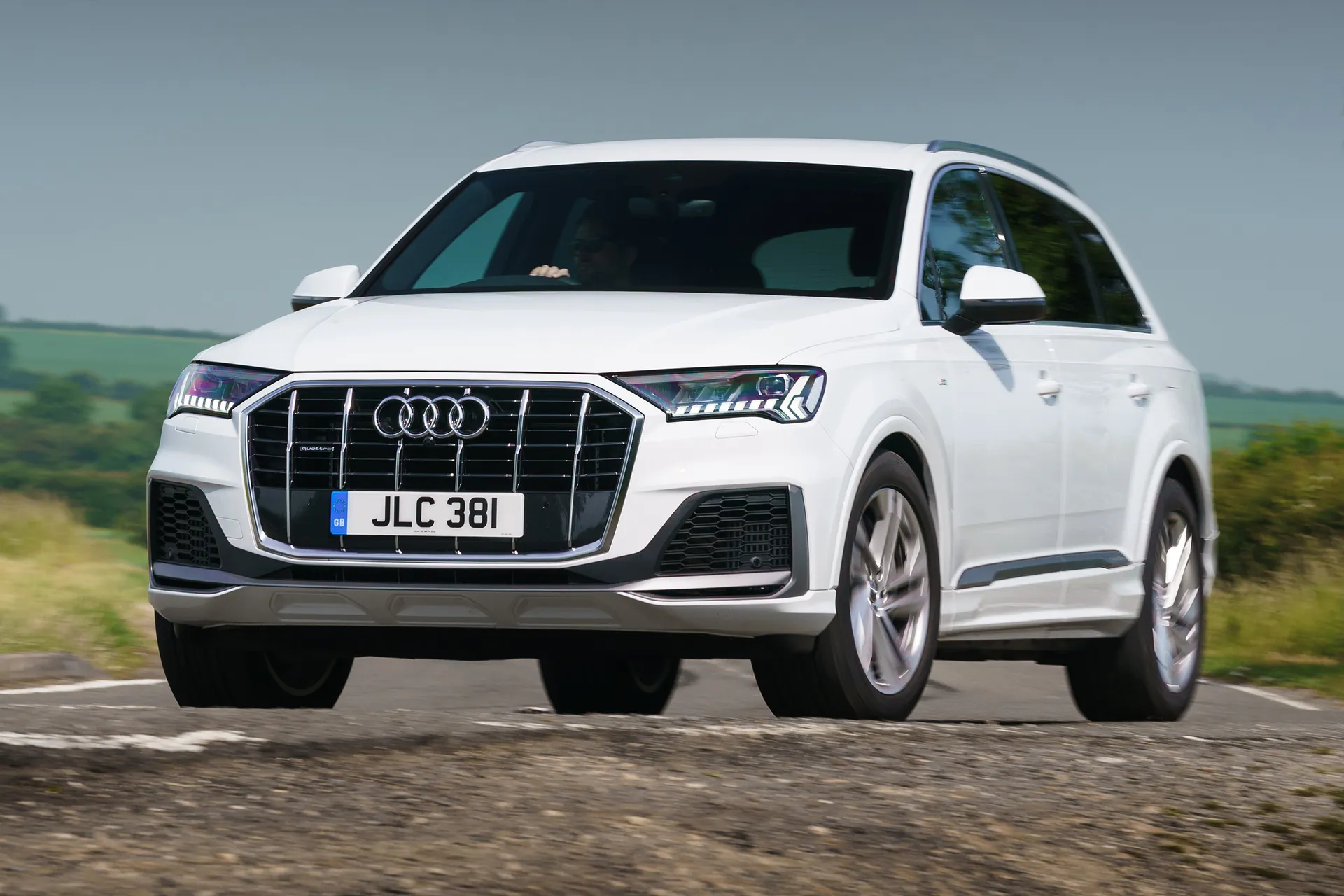
The earliest examples of this generation of Audi Q7 weren't fitted with air suspension as standard. While these are far from bad, the standard suspension allows a bit too much body lean and doesn't offer as smooth a ride at lower speeds as you might expect from a luxury SUV.
However, find yourself a car equipped with optional air suspension, or go for a post-facelift car that got it as standard, and the Q7’s balance of abilities here become seriously impressive. Most importantly in a car designed to carry large families, it’s extremely strong on comfort.
The suspension absorbs bumps of all shapes and sizes pretty much imperceptibly, making this one of the most cosseting and soothing cars in the class. Given this incredible comfort, it’s perhaps even more astonishing that the Q7 feels so agile in the corners. It has huge grip levels and uncannily strong control over body movements, and this means that the car feels like it shrinks around you on a twisty road. Steering that’s responsive, accurate and well weighted even lets you have a bit of fun occasionally.
Black Edition and Vorsprung versions also get air suspension, but it’s lowered by 15mm. As a result, the ride isn’t quite so effortlessly plush as it is in Sport and S line models, but it’s still more comfortable than it has any right to be. That becomes even more impressive when you consider that the Vorsprung has gigantic 22-inch wheels, yet it still keeps you comfy. The SQ7’s suspension is sportier still, and combined with the big wheels it does sacrifice some rolling comfort.
What engines and gearboxes are available in the Audi Q7?
Early on in the Audi Q7's life, you had the choice of two 3.0-litre V6 diesel engines with either 218PS or 272PS. We never drove the former, but the latter was great. Whether you were getting away from the mark or picking up speed on the move, it managed to hustle the enormous Q7 along with a surprising amount of urgency, and your progress always felt as effortless as it did brisk.
Later, these engines were upgraded to deliver 231PS or 286PS, and rebadged to become known as the 45 TDI and 50 TDI, respectively. The more powerful one feels pretty much indistinguishable from the one we’ve just described, just with the undetectable advantage of a few tenths against the stopwatch.
The lower powered version, meanwhile, will be strong enough for most drivers, but it does have to work a wee bit harder for equivalent performance, which is why the more powerful option edges it as our favourite.
The sole 'normal' petrol option is the 55 TFSI, which uses a 340PS 3.0-litre engine. We've yet to try it, but it's likely to lack some of the low-down grunt of the diesel, needing to be worked harder.
At the top of the range, the Audi SQ7 range-topper has been offered in two flavours throughout its life. The earliest version has a 435PS 4.0-litre diesel V8, which has loads of low-end punch and feels really muscular, giving the SQ7 an impressive turn of pace and - at a cruise - half-decent fuel economy. It even sounds good, although throttle response isn't the best.
Later SQ7s, badged TFSI were instead fitted with a 507PS twin-turbo petrol V8 instead. These offer more performance over a broader rev range than the diesels, and respond better to throttle inputs. They are, however, noticeably more thirsty, although if you're in the market for an SQ7, that's unlikely to be a big issue.
Finally, there’s also a diesel plug-in hybrid version that combined the V6 diesel engine with an electric motor to give 258PS, and the ability to run on all electric power alone for a few miles. We've yet to try that version, however, and not many are on the market.
All versions are mated to an eight-speed automatic gearbox, which slushes up and down the gears quickly, smoothly and easily. However, it’s sometimes hesitant to respond when you ask for a sudden burst of acceleration. That’s something you can say of most cars like this, but it’s particularly noticeable in the Q7.
Refinement and noise levels
Another area in which the Audi Q7 does a super-impressive job. Even on a coarsely surfaced motorway, you hear very little in the way of road noise, and wind noise is also very well isolated. You’ll barely hear a peep from the suspension, either, even when bumps in the road are doing their best to upset the calm.
The engines we’ve tried, meanwhile, finish the job off spectacularly well. You’ll hear a bit of a clatter from the diesels when you first fire them up, but that melts away once they’re warmed through, and from then on, they’re fabulously quiet and smooth. You only really hear them if you really get your clog down, which you seldom need to thanks to the engines’ prodigious muscle, and even then, the faint noise you hear is more satisfying than troublesome.
It's worth noting, however, that models fitted with the biggest wheels and lowest-profile tyres (such as the SQ7) do suffer from a bit more road noise. It's hardly intrusive, though.
Safety equipment: How safe is the Audi Q7?
The Audi Q7 has scored the maximum five-star rating in Euro NCAP crash tests, and when you look at the amount of standard safety kit it gets, that’s really no surprise. There’s LED lighting front and rear, a shedload of airbags, tyre pressure monitoring, automatic emergency braking, traffic sign recognition, lane departure warning and no fewer than six Isofix mounting points for child seats.
The roster doesn’t change too much as you move up the range, either, although the range-topping Vorsprung version does get a head-up display and a huge suite of autonomous driver assistance systems that’ll pretty much drive the car for you under certain circumstances.
Electric range and charging
The Audi Q7 plug-in hybrid is said to have a maximum theoretical range just shy of 40 miles on electric-only power, but what you actually get will depend on a number of factors: how you drive, the temperature, traffic conditions and so forth. In unfavourable conditions, you shouldn’t bank on getting more than 25-30 miles. A full charge of the battery will take around three hours on a 7kW wallbox charger or a little over twice that on a domestic three-pin plug.
MPG and fuel costs: What does an Audi Q7 cost to run?
"The latest versions of the Audi Q7 use mild-hybrid technology to eke out a few more miles per gallon. The V6 diesels are best for running costs, while it's no surprise the V8 and petrol models can be pretty thirsty."
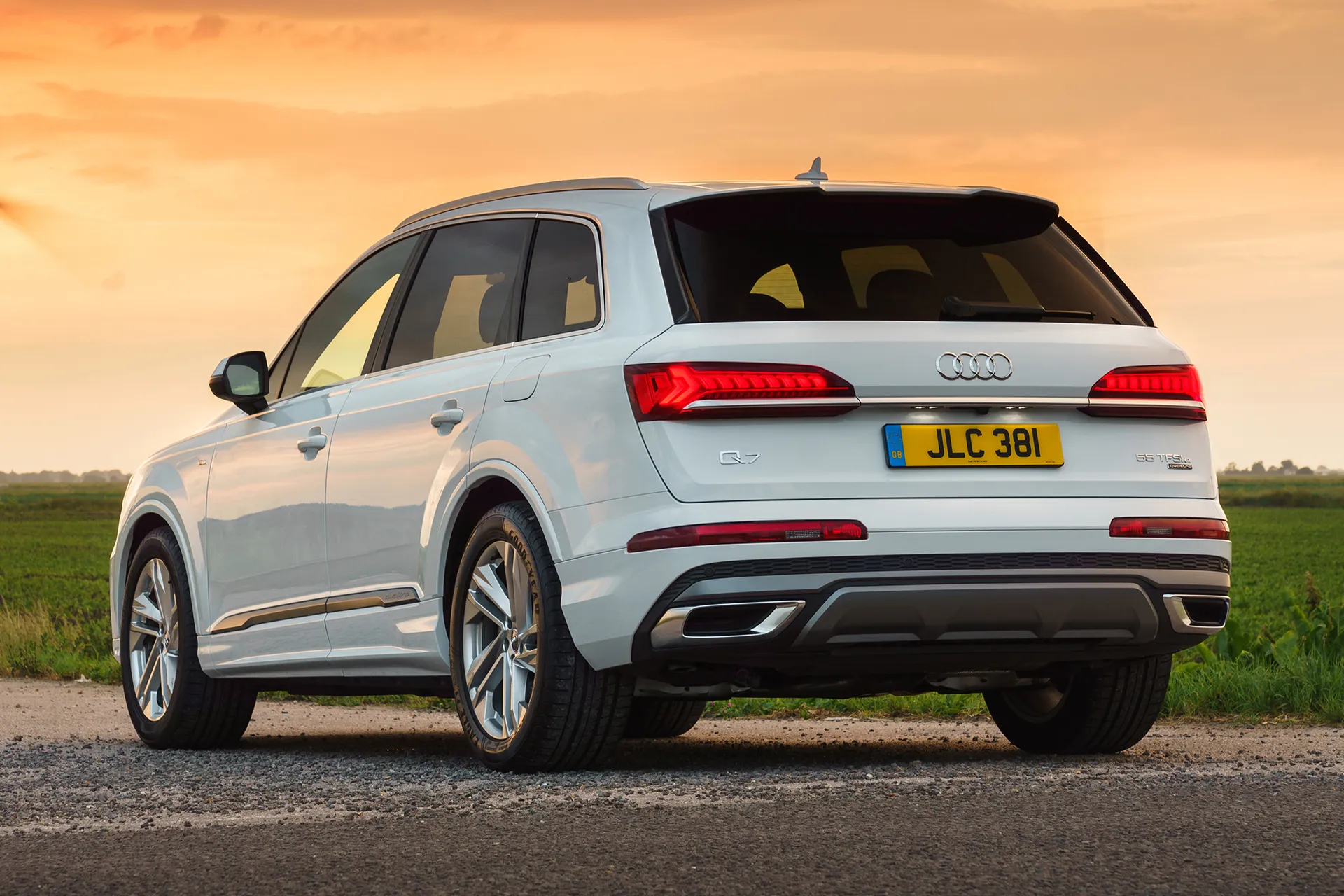
The Audi Q7's wide choice of engines means there's pretty much something for everyone. Don't expect any version to be as economical as, say, a large estate like Audi's own A6, however.
Despite their difference in power, both the 45TDI and 50TDI diesel engines have an identical maximum figure of 33mpg on the WLTP combined cycle, while the 55TFSI petrol gets about 26mpg. Matching these figures in the real world will be difficult, but you should get reasonably close if you drive sensibly. Which in a sensible car like the Q7, you probably will.
The E-Tron PHEV will be the exception, though, as it has an official (NEDC) figure of 156mpg. Good luck with matching that unless you can charge the battery up at home before every journey.
The flagship SQ7 in V8 diesel form is capable of up to 37mpg officially, although real-world driving should see around 30mpg if you don't use all of its performance too often. The petrol SQ7, however, can only manage 23mpg combined on the official test, which seems a fairly realistic figure.
How reliable is the Audi Q7?
Audi should benefit from the efficiencies of the wider VW Group, as its cars use a number of components shared across numerous brands and models. Despite this, Audi's performance in the 2023 HonestJohn.co.uk Satisfaction Index wasn't exactly dazzling. It was named 9th on the list of the 10 least reliable brands (although most of the problems reported seemed to be linked to the A4 and A6), and ranked a mediocre 16th out of 29 carmakers for overall owner satisfaction.
The Audi Q7 in particular is one of the brand's most complex and high-tech models, particularly if it's fitted with tech such as air suspension. That increases the possibility of expensive problems, but so far we've not heard of any major issues bar the odd problems with faulty sensors.
Insurance groups and costs
On post-facelift (2019) Audi Q7s, insurance groups start at 35 for the 45 TDI Sport, and rise to 49 for the fire-breathing SQ7. However, the majority of versions sit in groups 40 or 41, so somewhere in the middle.
That means premiums won’t exactly be cheap, but then again, you wouldn’t expect them to be on a big, expensive car like the Q7, and they will at least be very competitive with those of rivals.
VED car tax: What is the annual road tax on an Audi Q7?
Due to new tax rules that came in on April 1st 2017, all Q7s registered after that date will pay annual tax of £580 per year between years two and six of the car's life (factoring in the 'premium' car tax charge for cars that cost over £40,000 when brand new, as all Q7s do), and annual bills will drop to £190 after that. The one exception is the E-Tron PHEV, which gets a discount of precisely a tenner thanks to its clever hybrid drivetrain - big deal.
Cars registered before this date vary tremendously, however. E-Tron buyers pay absolutely nothing, while annual road tax charges on the other versions range between £165 on the entry-level diesel to £305 for the SQ7.
How much should you be paying for a used Audi Q7?
"The relative popularity of the Audi Q7, plus the fact it's been around for so long, means there are plenty of used examples around."
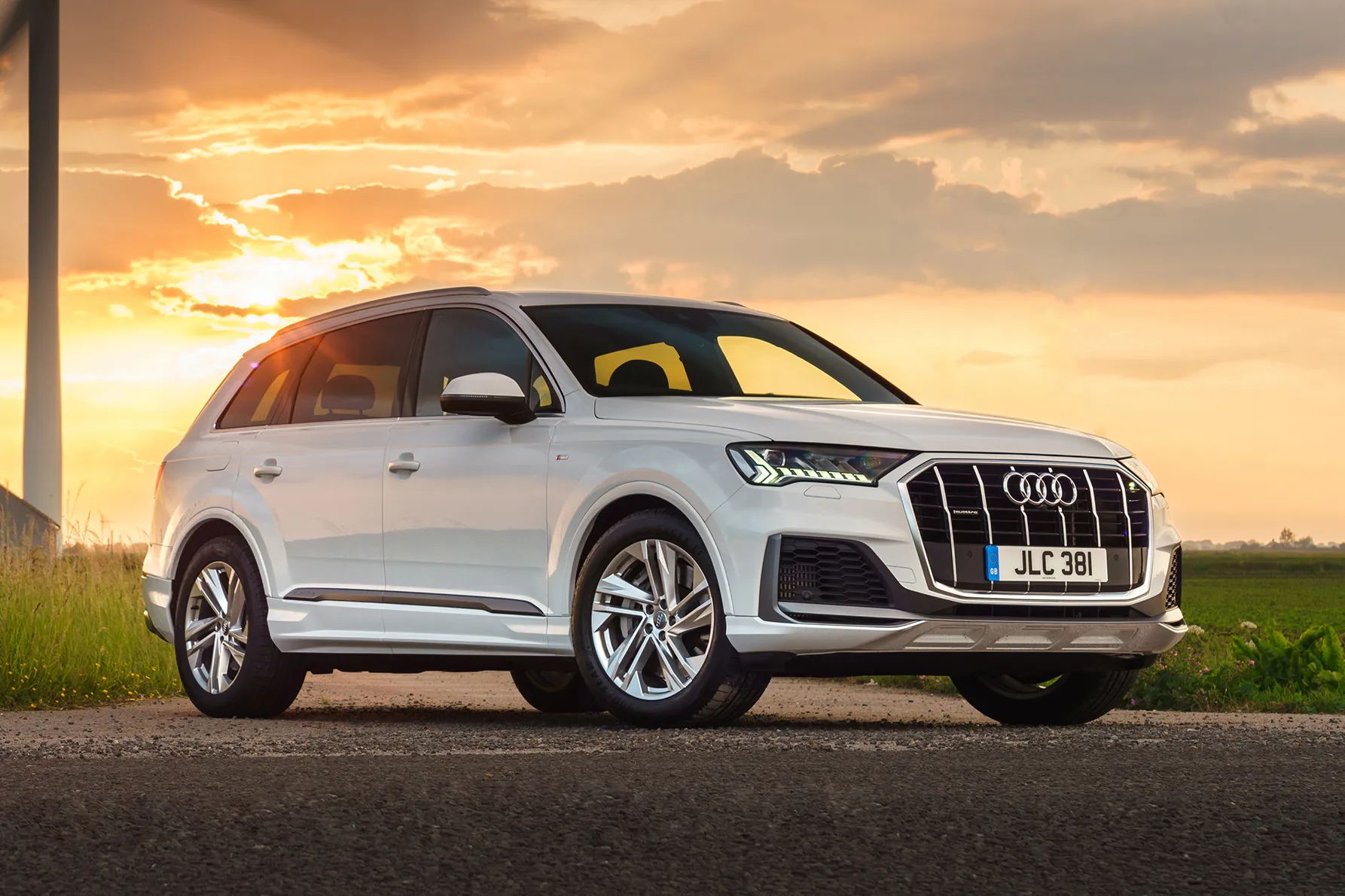
The earliest examples of the latest Audi Q7 in our classifieds (bearing in mind that cars for sale on our website can be a maximum of eight years old), kick off from around £25,000 to £27,000. That'll get you a diesel model in S-Line trim with between 50,000- and 90,000 miles on the clock. It's a price broadly comparable with rivals, and there's plenty of them around.
If you want a car built after the 2019 facelift to ensure that you get that air suspension, then you'll be looking at closer to £33,000. Post-facelift cars are quite tricky to spot from the outside, though, so it's best to look at the images of the interior to see which of the two infotainment systems the car you're considering has.
Petrol versions are much more scarce, although more have emerged in the last couple of years as diesel falls out of favour in the new car market. Expect to pay around £40,000 for a 2021 55 TFSI in S line trim.
Trim levels and standard equipment
The trim levels available - and what came with them - has changed a bit during the Audi Q7’s life. Here, we’ll concentrate on post-facelift cars of 2019 and after, so bear in mind that there will be differences on earlier examples. The entry-level Sport version is the one to go for, because it gives you all the items of kit you could want, plus a few more besides.
That includes air suspension, leather upholstery, a powered tailgate, heated front seats, dual-zone climate control, cruise control, keyless go and front and rear parking sensors. S line cars don’t get much more other than sports seats in upgraded leather and a few styling bits, but nevertheless, this is still the most popular trim.
The Black Edition adds a few more styling bits, along with sports suspension and four-zone climate control, where the Vorsprung is packed with pretty much anything your average luxury car owner could think of. Soft-close doors, four-wheel steering, heated rear seats, a BOSE sound system, a head-up display and autonomous driving aids are all provided.
There was another mild facelift in 2024 which saw S line trim become the entry-level offering, and some minor changes to the equipment lineup of each of the other trims.
Ask the heycar experts: common questions
Is the Audi Q7 a good car?
Does an Audi Q7 come with seven seats?
Where is the Audi Q7 made?
Audi Q7 Alternatives
Get our latest advice, news and offers
Keep me updated by email with the latest advice, news and offers from heycar.
By submitting you agree to our privacy policy
